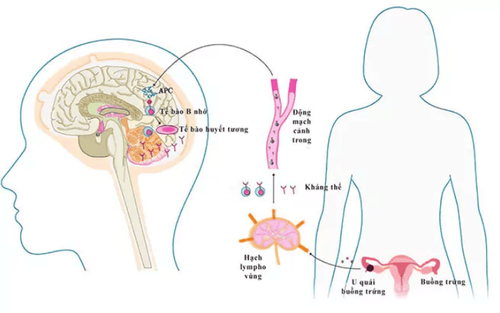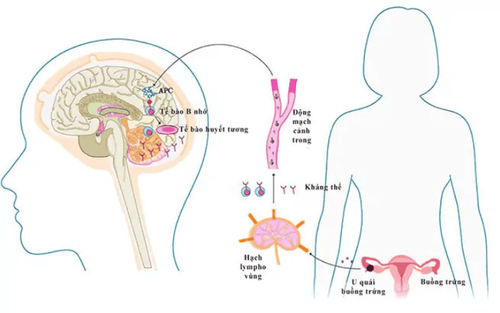This is an automatically translated article.
Autoimmune encephalitis is a disease that describes a group of conditions that occur when the immune system mistakenly attacks healthy cells, making it difficult to detect and determine the cause of the disease.
1. What is autoimmune encephalitis?
Autoimmune encephalitis are generally diseases that occur due to the inability of the immune system to distinguish between foreign antigens and self-antigens. Autoantigens are components of the body that, for some reason, become foreign, the body's autoantibodies against these autoantigens cause autoimmune disease to occur.
Autoimmune encephalitis is an inflammatory brain disease in which the body's immune system works abnormally and mistakenly attacks healthy cells and tissues in the brain or spinal cord. , which is complex and has the potential to cause rapid changes in both physical and mental health.
The pathogenesis of autoimmune encephalitis may involve antibodies bound to proteins on the surface or inside of nerve cells. Several proteins are involved in signaling between neurons. In some cases, autoimmune encephalitis occurs in association with cancer (paraneoplastic syndrome). Research into why certain antibodies attack healthy cells in the body is still ongoing. These surveys also show that this autoimmune disorder often occurs randomly, in people with no family history of autoimmune encephalitis.

Bệnh viêm não tự miễn
2. Clinical symptoms of autoimmune encephalitis
Autoimmune encephalitis is an inflammatory process occurring in the brain that can cause a variety of clinical symptoms, including neurological and psychiatric problems. Each case of autoimmune encephalitis often presents with different symptoms, specifically:
Symptoms of neurological diseases such as:
Short-term memory and cognitive impairment; Abnormal movements appear; Convulsions; Problems with balance, speech or vision are affected; Arms and legs become weaker; Have sleep-related problems, eg trouble sleeping, sleep disturbances ; The patient's psychiatric symptoms may see such as:
Mental disorder; Manifestations of hyperactivity, like aggression; Have unusual sexual-related behaviors; Having panic attacks; Coercive behavior occurs; Excessive excitement or excessive fear; Manifestations of hallucinations c, delusions Presence of catatonic syndrome or catatonia syndrome.

Người bệnh có biểu hiện của ảo giác, ảo tưởng
The above symptoms usually develop after a few days to a few weeks. Autoimmune encephalitis can progress to loss of consciousness and even coma. However, long-term mental problems (for months or years) are not a sign of autoimmune encephalitis.
On examination, autoimmune encephalitis has the following symptoms:
From the third week on, magnetic resonance imaging (MRI) of the brain and testing of fluid removed through lumbar puncture (cerebrospinal fluid) is performed. abnormalities may be noted. Tests showed NMDA antibodies (Anti-N Methyl-D-aspartate is one of the causative agents of autoimmune encephalitis).
3. Can autoimmune encephalitis be cured?
So far, autoimmune encephalitis does not have a specific treatment regimen. Accordingly, the current treatment methods are focusing on treating symptoms such as mechanical ventilation, anti-inflammatory with corticosteroids, combined with Immunoglobulin (IVIg). The duration of treatment is expected to last at least 3 months, however, autoimmune encephalitis has the ability to recur, about 1/5 of children with the disease have subsequent episodes. To some extent, you can prevent recurrent autoimmune encephalitis with long-term immunosuppressants such as azathioprine, mycophenolate mofetil, and regular monitoring of your health.

Corticoid được sử dụng trong điều trị viêm não tự miễn
4. Treatment for autoimmune encephalitis
Treatments will vary depending on the severity of the autoimmune encephalitis eg:
Corticosteroids and other immunosuppressive drugs are commonly used to control brain inflammation. In addition, you may also need medication to treat seizures or psychiatric symptoms. In cases where an ovarian or other tumor is found, medical professionals often treat the condition by performing surgical removal, which also significantly improves the patient's autoimmune encephalitis. Once the underlying encephalitis problem is under control, undertaking long-term rehabilitation such as physical, speech (communication) therapy, etc. can help you regain your original functions. Many cases of autoimmune encephalitis are often diagnosed in a coma, convulsion, and shortness of breath, so they often require months of treatment in the intensive care unit with modern resuscitation facilities: ventilators. , dialysis machine combined with special care, adequate nutrition, treatment of infections acquired during hospital stay.

Đến gặp bác sĩ để được tư vấn và thăm khám kịp thời
Most children and young people have a fairly good neurological recovery, but it can take a few months depending on the individual's ability to recover. Autoimmune encephalitis symptoms tend to improve first with problems related to movement, seizures, and cognition.
Currently, Vinmec General Hospital is implementing health checkup packages, including a neurological examination program, to help patients detect many diseases as well as warning symptoms early.
You can go to Vinmec medical system nationwide to be examined or you can register here!
MORE:
Distinguishing encephalitis and meningitis in children Common encephalitis, meningitis is Japanese encephalitis transmitted by which way?













